Full Disclosure: ScreenAnarchy's List of Shame - May (Part 2)
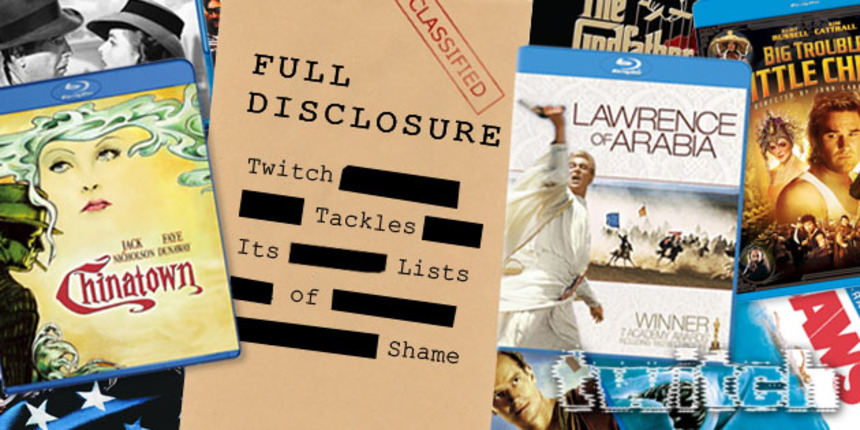

Rudy (dir. David Anspaugh, 1993 USA)
Charles Webb, Contributing Writer:
About halfway through the sports drama Rudy, at about the point where Sean Astin's would-be Notre Dame player Rudy Ruetigger starts reciting Ronald Reagan's "gipper" speech in full beneath an empty stadium, I started to wonder when he was finally going to snap and start taking out the Fighting Irish from a perch in a belltower. I say this because Rudy's is a largely delusional and slightly creepy vision of the world where if you just insist that you want a thing enough - despite a lack of discernible talent - they have to give you a chance.
This hagiography of the real-life Ruetigger promises us that he busted his hump, going without sleep and overcoming a learning disability in order to earn a spot on the team, and as sweet as that message is, it rings false. When asked why he should be allowed to play, Rudy's only response is that he wants to, more than any other player on the field, perhaps. It doesn't help that director David Anspaugh's languorously paced film can be broken down into maybe a dozen or more encounters between Rudy and some character who doubts his ample pluck, with our hero screwing up his face in its most pathetic contortions and his interlocutor giving in because how could you not?
I hated this movie with a depth that I didn't think was possible: nakedly and charmlessly manipulative, I can't believe this is a film beloved by so many sports fans.
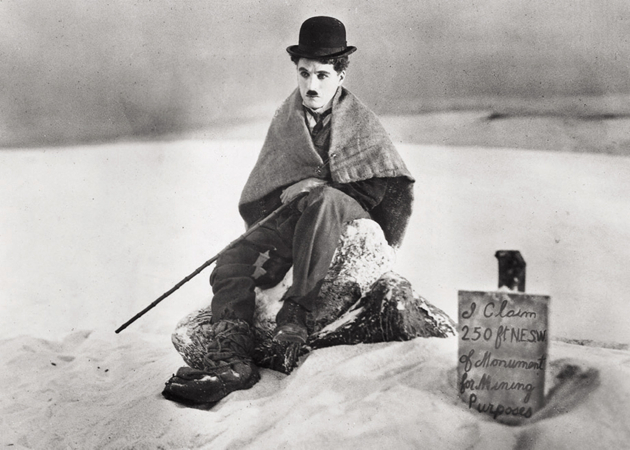
The Gold Rush (dir. Charles Chaplin, 1925/1942 USA)
Nominated for 2 Academy Awards, including Best Music and Best Sound
J Hurtado, Contributing Writer:
I have a confession to make: before this week I'd never sat through an entire Charlie Chaplin film. That's not to say that I've gotten bored and turned them off, it just seems that every time I try to watch one something happens and I get pulled away. It is a bit weird, I must admit, that I've seen and reviewed for this very site no less than a dozen films by Chaplin's contemporary Buster Keaton, but had never sat down with one of Charlie's. Hell, I've even seen Robert Downey Jr's Chaplin, but never a film by the man himself. Of all the films I could've picked, it was actually the AFI top 100 list that made me choose The Gold Rush, and I must say I'm very impressed.
The Gold Rush is a somewhat unusual film in that Chaplin recut, rescored, and recorded dialogue and narration for it in 1942 for a rerelease into theaters. His idea was that a silent film from 1925 wouldn't grab the imaginations of "modern" audiences, and to his dying day it was his preferred version of the film. In accordance with his wishes, this is the version I watched, and after having seen many silent Keaton films, I must say it was very odd to watch a film clearly shot and staged to be silent altered in this way. The thing it reminded me of most was Disney's Motor Mania, a famous Goofy cartoon that I've seen numerous times, perhaps even with narration inspired by The Gold Rush, I wouldn't be surprised.
Even though I'd never watched The Gold Rush before, there are several gags in it that were extremely familiar, simply because Chaplin's art transcends the films in which it appears. Perhaps the most famous, yet perhaps simplest, of Chaplin's gags in the film is the dance with the bread rolls at the dinner table, directly mimicked by a wonderfully astute Johnny Depp in Benny & Joon. This performance, less than a minute long, is one of Chaplin's most iconic (though perhaps inspired by a similar Fatty Arbuckle gag from 1917), and is so remarkably disarming, that it manages to create an emotional bond between Chaplin's Tramp and his unrequited love that she was not expecting.
Now that I've pretty much conquered Buster Keaton's catalog, and Criterion is preparing to release the films of the third in the triumvirate of silent comedy masters, Harold Lloyd, I suppose it's time for me to bone up on Chaplin before that new onslaught begins. I've watched most of The Great Dictator, but I must still see City Lights, The Kid, Monsieur Verdoux and the rest. This film assures me that I won't be disappointed, and that Chaplin's place in Cinema history is well deserved.
Niels Matthijs, Contributing Writer:
Up until this month's assignment, I approached each new film with a sense of hope. Not that I expected to find any masterpieces, but at least I always had a good reason to look forward to my assigned films. This month was a little different. I received Chaplin's The Gold Rush on my menu and so far Charles Chaplin probably has the worst track list of all directors I've ever come across. I simply cannot stand the man's films.
But The Gold Rush is considered an ultimate classic, so I sat down to watch my fourth Chaplin film (so far I had watched City Lights, The Great Dictator and Modern Times), only to find that this one wasn't going to change my opinion of his work (note that I watched the original, silent cut). It only strenghtened my belief that Chaplin and I just don't mix well.
It's not that I can't appreciate silent films. They're not my favorite kind of Cinema, but I found things to like in Das Cabinet des Dr. Caligari, La Passion de Jeanne d'Arc and Sunrise: A Song of Two Humans. I did find the text panels to be extremely slow (you can read a sentence three to four times before it disappears) and random (sometimes Chaplin explains things that are glaringly obvious, while at other times scenes could do with a little more explaining) and the music to be a bit too "poppy" (I'm not a fan of classical music but I think I recognized at least three or four numbers).
In the end it all boils down to Chaplin's sense of humor. I understand that he's a landmark when it comes to comedy and that the popularity of certain gags is due to his involvement, but over the years I've come to like humor that manages to surprise me in some way or another. If I can predict the timing, delivery and punchline of a joke, I simply don't think it's funny anymore. And Chaplin's film is one endless string of such moments, boring me to the point of irritation.
There's a romance that I didn't care for and some special effects that looked horribly dated (due to conflicting sources I couldn't really make out if they were on par with the norm when the film was released), but I'm sure none of that could've saved the film for me. I just don't like Chaplin and The Gold Rush could bring nothing new to the table.
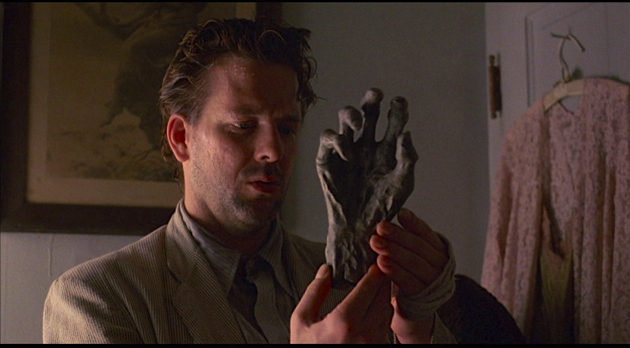
Angel Heart (dir. Alan Parker, 1987 USA)
James Dennis, Contributing Writer:
Angel Heart is probably the least revered film on my list, but one I've always been drawn to and felt I should have seen. Robert De Niro and Mickey Rourke, directed by Alan Parker was enough to get me sniffing around it for many years without ever committing. I think the promise [SPOILER] of De Niro as (possibly) the devil sounded both intriguing and hopelessly daft, leaving my relationship with the movie in a perpetual limbo until now.
As with all my choices so far (lucky me), I'm glad I made time for it. I loved the Deep South, noir pastiche; a dirty world of sex, violence and creepy chickens just waiting to be unearthed by Rourke's increasingly anguished PI. Stuffed full of visual and aural motifs, it oozes atmosphere as readily as Rourke's sleazy PI sweats.
More conventional than I was expecting, the narrative functions as a straight up noir mystery for the most part (albeit one with conspicuously anachronistic 80s sax intrusion), punctuated with moments of black comedy and some vividly realised psychological trauma. Yet an altogether more parodic direction threatens whenever De Niro's Louis Cyphre crops up to check on proceedings. De Niro is clearly having a blast, but his character is oddly misjudged, jarring with what transpires to be a voodoo-laced tragedy. Simply, it's 'a bit much'.
Ultimately Rourke's performance compels throughout and as with his renaissance piece, The Wrestler, it reminds you of how absolutely on fire he can be when given the right opportunity. Perma-smoking his way from lead to lead, with an increasingly shuffling gait, he's the quintessential out-of-his-depth investigator after an easy buck, but drawn into a world of sin way over his head. The ending dissatisfies, but it's a hell of a lot of fun getting there.
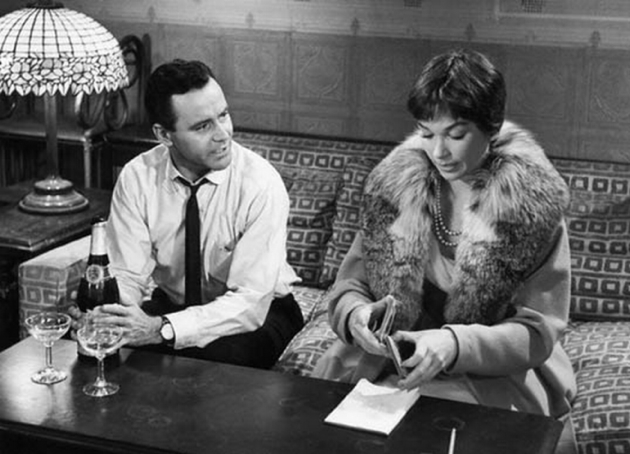
The Apartment (dir. Billy Wilder, 1960 USA)
Winner of the Volpi Cup for Best Actress at Venice Film Festival, Winner of 5 Academy Awards, including Best Picture, Best Director and Best Original Screenplay, winner of 3 BAFTAs, including Best Film from any Source, Best Foreign Actor and Best Foreign Actress
Jason Gorber, Contributing Writer:
I've come to Billy Wilder relatively late in my cinema explorations. It was only last summer that I delved into his two celebrated films featuring Ms. Monroe. While I didn't dig his Itch, I did fall hard for Some Like It Hot, finding the perfect blend of Wilder's celebrated mix of slapstick, witty wordplay, and moments of great pathos, all mashed together in a genre- (and in that case gender-) bending romp.
The Apartment is kind of a darker, more intense sibling to Some Like It Hot. There's a real snark to the work, taking the piss out of clambering up a corporate ladder. Wilder even managed to throw in a Marilyn mimic, a scathing (if perhaps not inaccurate) whispy-voiced portrayal of his celebrated former star seeking out yet another glass of bourbon.
You've got a Three's Company-style farce at the heart of the narrative, yet it's a story mixed with suicide, adultery, broken hearts and broken dreams. The shifts in tone can almost give you whiplash, and the fact that fifty years after its release it can still have that affect is a tribute to Wilder's genius.
Still, while I appreciate what the director was getting at, I've seen such shifts in tone done with a bit more elegance from the sons that Wilder hath wrought. Take Gilliam's Brazil for example as a film that more deftly shifts tone, or even the Coen's The Hudsucker Proxy as a work that deflates the notions of success. You can also of course see echoes of this film in the smart romance classics like Manhattan and When Harry Met Sally.
Still, we shouldn't give the children credit without respecting the parent, nor would Wilder want us to forget Lubitsch, grandfather of all that Billy brought to us. There are some interesting throwbacks to 20s and 30s Cinema in the work, from fades to black, to the Noirish compositions of the often stark photography.
The cast is of course strong, with MacLaine and MacMurray playing things note perfectly, joined by a remarkable ensemble cast, from Jack Kruschen as the neighbour doctor to the quartet of lecherous managers that make use of the space. Yet above all there stands Jack Lemmon - the man is practically elastic, the real special effect at the heart of the story. Quite simply, the film would be nothing without him, and it's clearly one of his (many) great roles.
I like how unapologetically "Jewy" the film is - the goal after all is for C.C. to be more "mensch" than "schlemiel" - thus making explicit the specific New York ethnic angle played out more overtly than many modern works do.
So, while I didn't fall in love with The Apartment, I do appreciate the hell out it, and recognize how astonishingly well it must have played in 1960. Both a commercial and (eventually) critical success, it's bold, broad, inventive, and fearless. It's also, clearly, a classic that's required viewing for all.
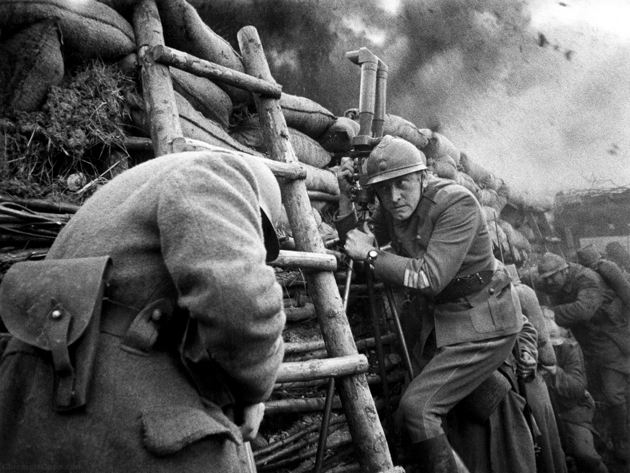
Paths of Glory (dir. Stanley Kubrick, 1957 USA)
Nominated for the BAFTA for Best Film from any Source
Jim Tudor, Contributing Writer:
Before finally seeing Stanley Kubrick's World War I indictment Paths of Glory, I already knew quite well what it was like. A colleague at my own site ZekeFilm.org, Paul Hibbard, informed me that he doesn't really cry watching movies, but Paths of Glory is the one film that made him cry twice. Prior to that, I was familiar with the proclamations of Gene Siskel of it being perhaps the single greatest anti-war film ever made. But I never knew exactly what Paths was really about.
Kirk Douglas' mostly-righteous Colonel Dax, a promising higher-up in the French army, is the kind of traditional movie star role that one would expect from an MGM production circa 1957. But that may be the only traditional aspect of Paths of Glory, a film so unafraid to gaze into the soiled heart of mankind, it almost hurts. Dax is cool-headed in the face of the worst kind of systemic injustice, and verbose on cue when it comes to articulately addressing the perpetrators. But if a few such well-written conventional Hollywood instances are what it took to forge the whole of this film, so be it. Douglas' character does not offend the film's purpose to any degree.
In the Movie Geeks United podcast devoted to Kubrick's early work (part of their indispensible "Kubrick Series" - a must-hear), one expert points out that this film is the clear start of the signature Kubrick style. The developing obsessions, both visually and intellectually, are there. Among them are his pointed use of classical music and lavish interiors (of the generals). The way the camera tracks through the mud trenches (barely wide enough for the dolly itself) is a glimpse of the impossible precision to come in his career. There's minor lens flare and residual lighting falloff - considered sloppy at the time, but was no doubt deliberate. These flourishes prefigure one meat grinder of a botched assault. The troops' re-action to its unobtainable objective takes the film to a bleak place of inevitable tragedy.
Once the dust settles, we come to realize that the glory to be had was for the French military officials, who get to continue down their paths of ignorant sadism. And so, we arrive at the end, wherein the future Mrs. Kubrick, playing a bullied German girl, is forced into singing for the French troops during pub R&R. (For the first time in a movie full of Americans playing French military, someone speaks in a native tongue.) She sings, and the men carouse, but then her melancholy becomes contagious, and empathic tears flow in a Stanley Kubrick movie. In this most human moment, they are unified in the inhumanity of it all, that their paths lead to no glory, and may not even be paths.
I leave this write-up without going into what the exact storyline of Paths of Glory is, even as I laid out what it's like, what it's about. Hopefully the case has been made for the film, one of Kubrick's masterpieces.
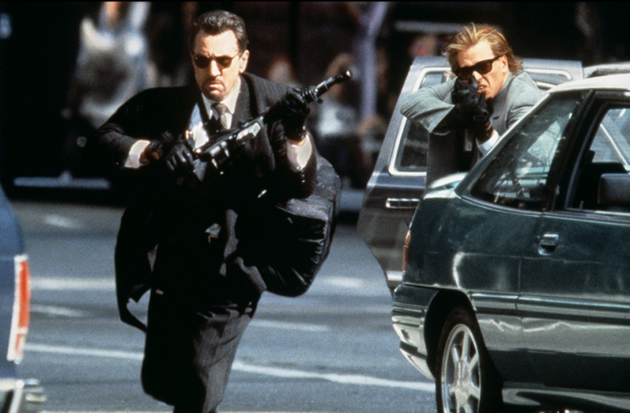
Heat (dir. Michael Mann, 1995 USA)
Joshua Chaplinsky, Contributing Writer:
1995 was a powerhouse year for films that would go on to become part of a lot of twenty-somethings' cinematic canon. Se7en, The Usual Suspects, Braveheart... and Michael Mann's three-hour crime epic, Heat. Of those four films, the only one I didn't see in the theater was Heat, for whatever reason. I wasn't yet the well-watched film buff I claim to be today. I'd always heard how good it was, and whenever I told someone, "I've never seen Heat," they'd switch the pronoun and repeat the sentence back to me with maximum incredulity.
I've enjoyed a number of his films, but I've never been a huge Michael Mann guy like some people. Of the rest of the previously mentioned 90s hit-makers, the only one I will see every scrap of film they shoot is Fincher (unless it is Benjamin Button 2: The Rebuttoning). So not seeing Heat wasn't a stigma because it was considered a Michael Mannsterpiece, it was because it was considered a benchmark in 90s Cinema.
And make no mistake, it is VERY 90s. The wardrobe, the hair, the Skinemax score - it definitely dates the picture. But neither that nor an ensemble's worth of scenery chewing - including some now classic Pacino moments - can take away from a well told story. I can see what all the fuss was about, especially if you first saw the film in your formative viewing years. Multiple threads build slow, to weave an engrossing tale of competitive obsession between two very different, yet very similar characters. As for the actors who play those characters, I can't say their first ever big screen faceoff is as mindblowing as everyone claims, but it is pretty damn cool. Overall, Heat isn't likely to crack my top ten or even twenty-five or fifty, but it's a worthy notch to add to my bedpost.
Kwenton Bellette, Contributing Writer:
I've confused Heat with Ronin on a few occasions in my past. Perhaps it was the Robert De Niro factor, but I didn't particularly enjoy Ronin and for some reason just skipped Heat. I suppose back at the time of its release,and for many years since, I was heavily into Asian Cinema and only the Hollywood blockbusters or pure genre pictures would pique my interest. And yet, I recall seeing Heat in the rental store, in the 'Recommended' or 'Popular' section.
Flash to 2013 and I have now seen the definitive heist-thriller of all time. Heat is exceptional, it is absolute perfection. It is both a slow burn and a fire cracker. It is a deep meditative character study, yet also a chaotic glorious mess.
The entire film encapsulates the heist concept, far beyond the 'job gone wrong' itself, and speaking of when it all goes down, you can bear witness to one of the messiest and intense action scenes in recent memory. If you have not seen Heat or don't like Michael Mann, rectify this immediately; it's a cinematic milestone.
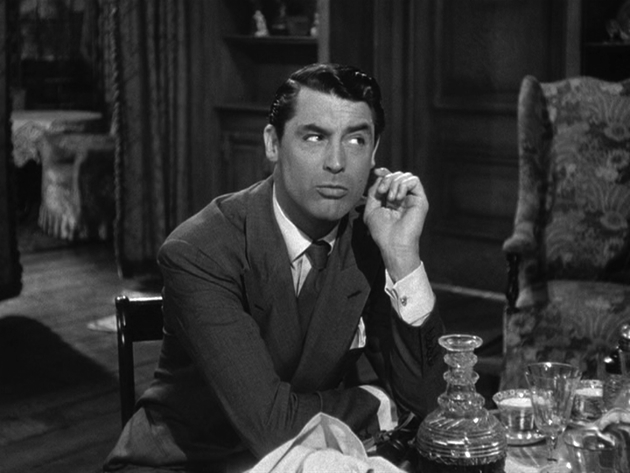
Arsenic and Old Lace (dir. Frank Capra, 1944 USA)
Kurt Halfyard, Contributing Writer:
"Insanity runs in my family. It practically gallops." Now I like a good screwball farce, from Ernst Lubitsch and George Cukor to David O. Russell and the Coens. I've always felt that the films Frank Capra marked a hole in the genre for me, and here was a chance to sit down with the 1944 macabre classic Arsenic and Old Lace. The setting is Halloween, with the old Brewster ladies poisoning their house guests as an act of social charity for getting lonely old men to heaven a little faster, with Cary Grant caught in the middle with his pretty new wife. And just for kicks, Peter Lorre as Dr. Einstein, no, not the patent clerk.
At over two hours, the bloated piece-meal inanity of misunderstanding and personal hubris on display left me rather cold. Perhaps multiple viewings are in order to make the synchronicity of a bugle horn blast, a charge up the stairwell and a broken clock dropping its minutes with a clang become surreally funny. Maybe I should just go back and read my Charles Addams strips instead. There are moments where things work themselves into the shouting frenzy of convoluted pitter-patter in the Brewster living room (and kitchen), but I never felt the film ever came together; rather, I sat on the edge of tedium for the bulk.
Mortimer Brewster, a famous drama critic and author of popular anti-marriage books, (inexplicably) marries the girl next door, only to have his wedding day hijacked by his crazy Brooklyn family when he stops in en route to Niagara Falls. Is this film a sly critique of lowbrow New York City stagecraft in the form of a middle-brow adaptation of a popular stage play? Everyone from the local beat cop to the asylum overseer has a play in his back pocket. Johnathan Brewster, The Boris Karloff inspired serial killer (played by Raymond Massey) is asked at one point, "Where did you get that face? Hollywood?" Is this pre-Kaufman madness, or just random running around for simple laughs? I suspect the latter, but I was left scratching my head as to why I should be getting off on Cary Grant's exasperated faces and mumbling to himself for being so far out of the loop to stretch the credibility of even this, the nuttiest of genres.
Where do the old aunties disappear for nearly 45 minutes of run-time when everything comes to a head in their home? Why is the lieutenant more focused on the bugle playing simpleton over a nation wide mass murderer? (I'll give the writers props for Peter Lorre's escape at the hands of gross police incompetence, if only because it's the best joke in the film.) Finally, other than that the picture needs a dame, what exactly was the point of the smitten anti-marriage angle that seems be the focus of the film until it isn't? I'll stop asking questions now, I should have gone with a Howard Hawks picture instead.
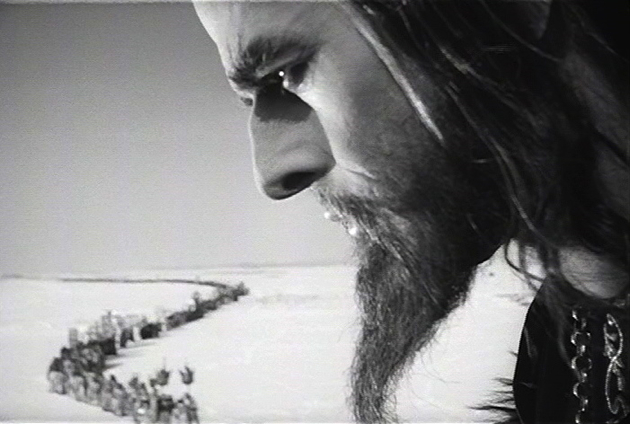
Ivan the Terrible Part 1 (dir. Sergei Eisenstein, 1944 Soviet Union)
Peter Gutierrez, Contributing Writer:
Decades ago, when I was budding teenage cinephile, someone gave me a copy of The Fifty Worst Films of All Time by Medved and Dreyfuss, and that was the first time I'd heard of Ivan the Terrible. There, tucked in among Elvis flicks, horse-starring Westerns, and psychotronic fare such as Robot Monster was Eisenstein's historical drama about the famous/infamous Tsar. Even many years later, when I grew to doubt many of the book's entries (Peckinpah's Alfredo Garcia? Really?), and was pretty much blown away by Battleship Potemkin, I still stayed clear of Ivan. When I finally noticed that it actually appeared much more often on canonical lists of all-time greats, I was intrigued but still wary: I figured that viewing it would be like taking medicine that you know is "good for you" on some level, but is still hardly enjoyable.
Now, having emerged from the other side, I can report that there's a bit of truth in that assessment. Let me explain.
Fascinated while I was watching it, I nonetheless took several sessions to get through the film. What I learned along the way is that though Eisenstein errs far more often on the side of the former, there's a fine line between bold, strikingly minimalist pageantry and mechanical staginess, as well as between expressionistic iconography - using the human body and face as emotional symbols - and leaden pantomime. At the same time, though, I'm highly conscious of how one's perspective, culturally and historically, can affect how Ivan the Terrible lands.
When I saw it, I was struck by how many of the conventions of Silent Cinema are transposed to this mid-'40s talkie, and how the result, aesthetically, is intensely interesting throughout - for me, not everyone. You almost feel that Eisenstein is this close to inventing some kind of sublime hybrid of the two eras. But while noticing this sort of thing and being quietly thrilled by it, I still realize that it alone might not work for other... movie buffs (i.e. those who place a premium on narrative engagement) as opposed to "film" buffs. (For the record, I fall somewhere between the two.)
That's not to say that Ivan is a disaster in narrative terms. Far from it. It's just that I'm acutely aware that it's helpful if one is in the mood to make ideological and thematic connections to, say, the Communist-approved historical epics that Zhang Yimou embarked on, starting with Hero. In short, if you're prepared to read subtext with as much gusto as you read plot, character, and tempo, then Ivan the Terrible is less a chore and more a revelation. And, hey, at the risk of glibness and losing all credibility, may I suggest that the gallery of facial hair on display is alone worth your time?

Do you feel this content is inappropriate or infringes upon your rights? Click here to report it, or see our DMCA policy.






